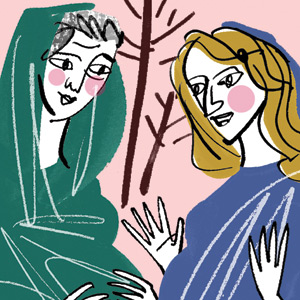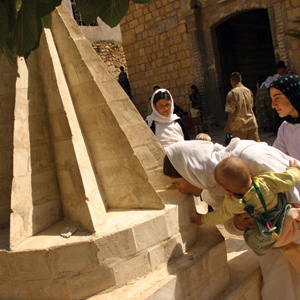The antique, part mud-brick, mazy city of Yazd does not seem to have much to do with Christmas: it sits amid desert and mountains in the centre of Iran, and has no Christian inhabitants. Yet this city plays its part in the drama of the Nativity and gives some insight too into the fate of religions in the Middle East.
Most of the region’s 10 million non-Muslims are Christians, but a mosaic of other religions is also represented. Some are on the verges of Islam; some have their own distinctive heritage. Their fates are to some extent intertwined. Among them are the Zoroastrians; Yazd is one of the last places in Iran where they can still be found.
Fifty years ago, in one of the city’s single-storey houses, a girl called Shahin used to glimpse her grandfather studying the stars. He was a Zoroastrian priest or mogh – or magus, as the word is rendered in Greek and Latin. But this was before the Islamic Revolution caused Shahin and many who shared her faith to flee Iran.
The Zoroastrians follow the 3,000-year-old teachings of the prophet Zarathustra, who taught that the world was a battlefield between good and evil. They were known in ancient times for their rejection of idolatry and their reverence for the elements. More recently, the magi were noted for their supernatural powers. Mesopotamia and Iran were famous for astrology: the signs of the zodiac, aspects of modern horoscopes and our names for the planets go back to ancient Babylonian astrologers.
The Magi who followed the star to Bethlehem would have been understood as coming from that tradition. In the seventh century, when Iranians (still then Zoroastrian) invaded the Byzantine Empire and reached Bethlehem, they planned to sack the Church of the Nativity but it is said that on seeing pictures of the Magi on the walls and recognising them as Zoroastrian priests, they desisted.
There are probably fewer than 5,000 Zoroastrians in Iran. But just as pagan Germanic traditions survive in our British Christmas – the Yule log, the Christmas tree – so modern Iranian Muslims still celebrate festivals invented by their ancestors. One of the highlights of the Iranian year is the festival of Nowruz, the New Year, which celebrates the victory of spring over winter.
The Yazidis of northern Iraq, who have suffered so much at the hands of Islamic State, revere as their founder a twelfth-century mystic called Adi ibn Musafir. His contemporaries knew him as a Muslim missionary; it seems that his followers took on some aspects of Islam but merged them with older beliefs in reincarnation, the redemption of the Devil and non-existence of hell, and the possibility that divine beings could exist in physical form, whether as planets or in human guise.
In the early twentieth century, Yazidis sometimes displayed copies of the Qur’an as a means of self-protection. But it was said that they always removed from it the word Sheitan, the Muslim word for the Devil, since they consider it an insulting term to use of the once-fallen, now-forgiven, highest of all the angels. They know this being by another term, the Peacock Angel, and in this form pay reverence to him by kissing bronze bird-like images that were once carried reverently around their now-scattered communities.
The Druze and Alawites of Lebanon and Syria share many of the ancient ideas that the Yazidis believe – reincarnation, for one, and the possibility of God taking human form. All these different groups are distinct, and some cleave more closely to Islam than others: the Druze beliefs are very close to early versions of Islam, when the boundaries of the faith were less clearly defined and Greek philosophy was highly influential.
When Egypt adopted Christianity, few pharaonic traditions were allowed to survive. Early Protestants likewise wanted to root out everything that hinted at magic or paganism.
Globalisation makes the policing of orthodoxy easier: deviations from it can be spotted faster and condemned more widely on social media. Also, as native Arab culture and the traditions of the village die away, a new and less tolerant style of religiosity is replacing them, in defiance of the secular world. Some politicians exploit this, offering religious solutions to political problems, and calling for unity in the face of the Christian or secular enemy.
Attitudes to Christians, too, are conditioned by this deepening desire for a common religious identity. Iraq’s Christians have the oldest surviving liturgy in Christian usage, and their ancestors sent missionaries and established monasteries as far as China; they inspired the Mongolian alphabet; they had bishoprics in places such as Tibet, Kashgar and Shiraz. Now, driven from Baghdad and their villages near Mosul, they face a choice only of what kind of exile to endure. Their language of Aramaic survives from ancient Babylon and is the language of their many saints and theologians, but today is easier to hear in Chicago or Detroit than it is in Baghdad. Now Mosul is under the rule of the cruellest and most intolerant of all Islamist movements, which has slaughtered its Yazidis and expelled its Christians.
So the Middle East increasingly resembles Reformation-era Europe: Shia and Sunni Muslims square off against each other, with Arab Shia (rather like English Catholics in the seventeenth century) being accused of unpatriotic alliances with a foreign power, in this case non-Arab Iran, and Sunnis of lining up with Saudi Arabia; and holding unorthodox or idiosyncratic religious views is dangerous. The religious sphere is increasingly dominated by intolerance and fundamentalism. Non-Muslims are increasingly persecuted or driven out and liberal-minded Muslims find that rather than challenging the clergy, it is much easier to keep your head down – or emigrate. Wise men, sad to say, still journey West.
Gerard Russell is a former United Nations and British diplomat. He is the author of Heirs to Forgotten Kingdoms: journeys into the disappearing religions of the Middle East.
17 December 2015, The Tablet
Shifting sands
Multi-faith culture
Edmund for England
 Loading ...
Loading ...
Get Instant Access
Subscribe to The Tablet for just £7.99
Subscribe today to take advantage of our introductory offers and enjoy 30 days' access for just £7.99





What do you think?
You can post as a subscriber user...
User Comments (0)